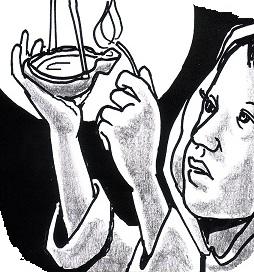

“The foolish said to the wise, “Give us some of your oil, for our lamps are going out” (Matthew 25:9).
1 Cor 1:17-25; Matt 15:1-13).
Both of today’s readings focus on the importance of wisdom. Writing to the Corinthians, St. Paul compares the so-called wisdom of the world with God’s wisdom, revealed in the paradox of the cross. A world that measures success by power and human logic cannot grasp the meaning of Christ’s crucifixion, a sign of failure that in fact revealed God’s redemptive love for a sinful world.
We recall that Paul’s ministry in Corinth had attracted mostly former pagans, slaves, and household servants representing the lower classes. As an important transfer point for ships between the Adriatic and Aegean Seas, it had a reputation for all the unsavory aspects that go with port cities, including prostitution. When Paul contrasts the lowliness of his faith community to the respectabilities of the wealthy and educated Greek classes, he is seeing divine wisdom in evangelizing people who would understand Jesus’ lowly estate and the scandal of his death.
The wisdom of sacrificial love and service is the heart of the Gospel. Instead of overwhelming the world with threats and righteous indignation, God chose to draw sinners with divine mercy and the example of reconciling love. Jesus’ sacrifice was revealed as the triumph of love over sin and death by his glorious resurrection. The Corinthians, for all their problems, embraced the example of Jesus as the answer to their own suffering and as their source of hope.
The Parable of the 10 Bridesmaids brings together several themes common to Matthew’s Gospel and the needs of his community. Jesus’ promised return is cast as the long-awaited arrival of a bridegroom to a wedding feast. Believers are bridesmaids keeping vigil, some of them prepared and some not. The oil they need for their lamps is wisdom, the light of faith that enables them to see in the dark interval as they await Jesus. The drama makes clear that without this oil, no one can see and thus respond to the faith event of the risen Christ. And the oil is non-transferable; it must be your own.
As an allegory, the parable sometimes stirs sympathy for the foolish bridesmaids and shock at the selfishness of the wise bridesmaids. In his 1955 novel The Last Temptation of Christ, Nikos Kazantzakis has the arriving bridegroom relent and let the rejected bridesmaids into the wedding. The parable preserved by Matthew ends with Jesus saying to them, “I do not know you,” words meant to remind us that salvation is a relationship with Christ that must be cultivated to survive. Heaven is the continuation of that relationship in eternity, so now is the time to respond to God’s gift of faith.
St. Augustine, whose feast we celebrate today, is a model for the journey to faith, however we might meander and delay. He famously said, “You have made us for yourself, O Lord, and our hearts are restless until they rest in You.” God’s love is built into our consciousness, and even if we ignore its invitation, it never ceases to pursue us because it is the meaning and purpose of our existence.
Advertisement








